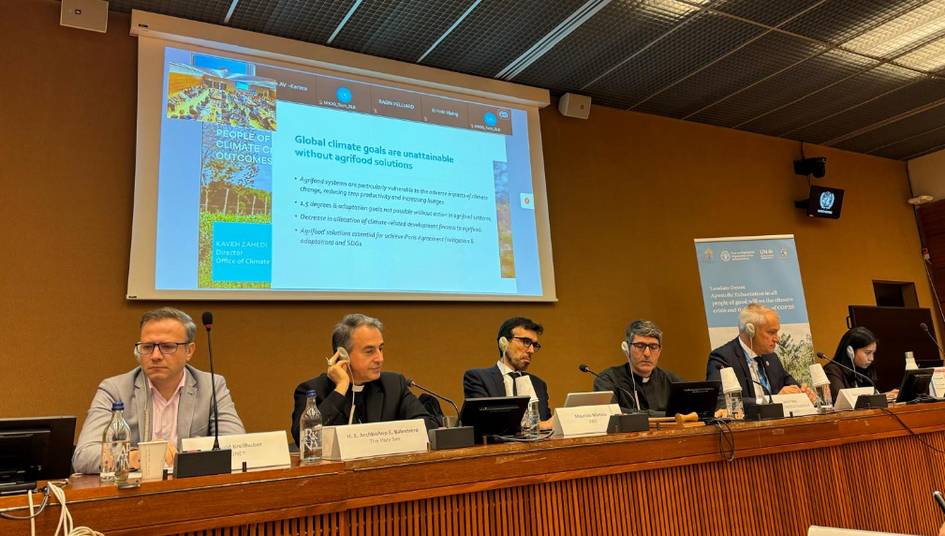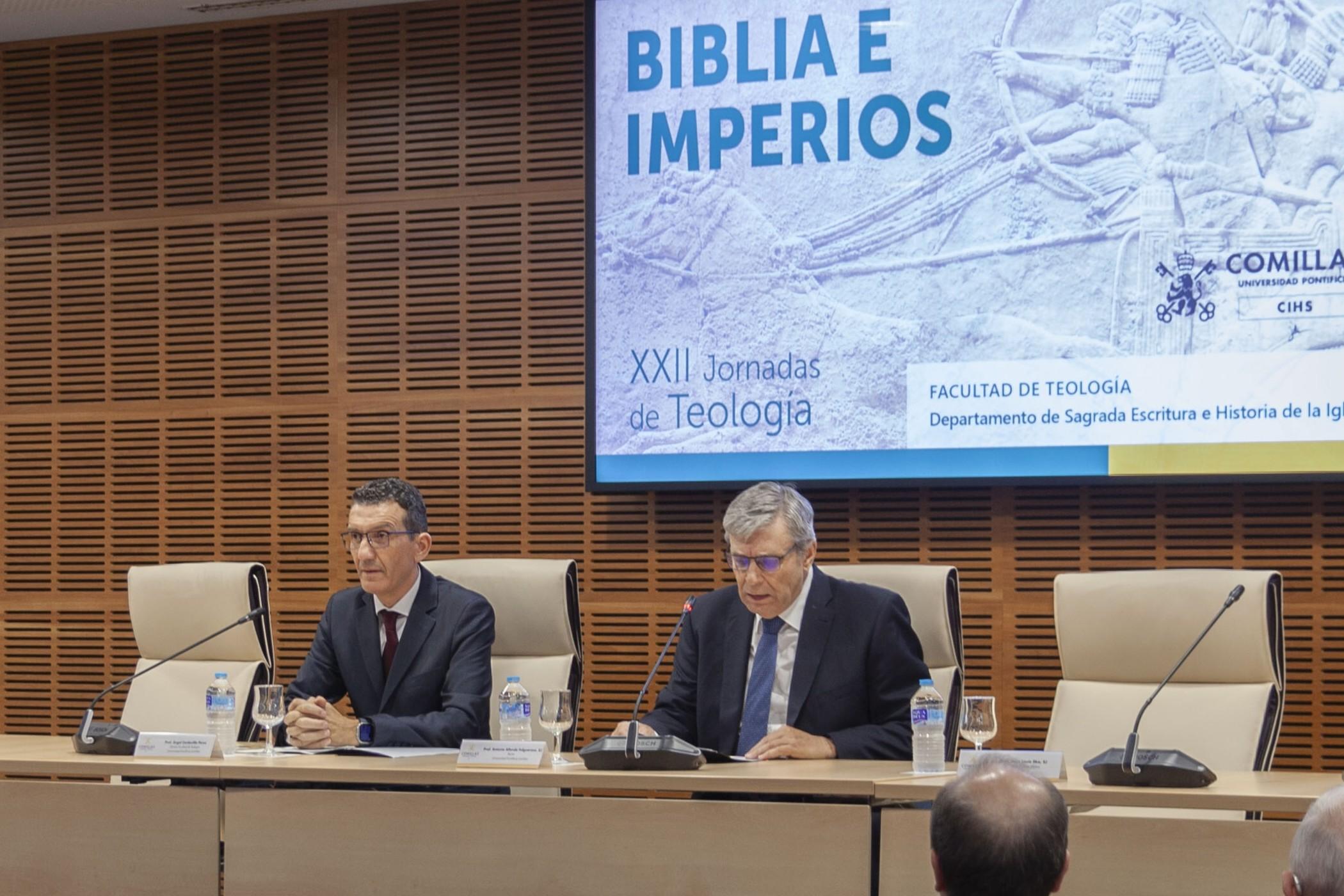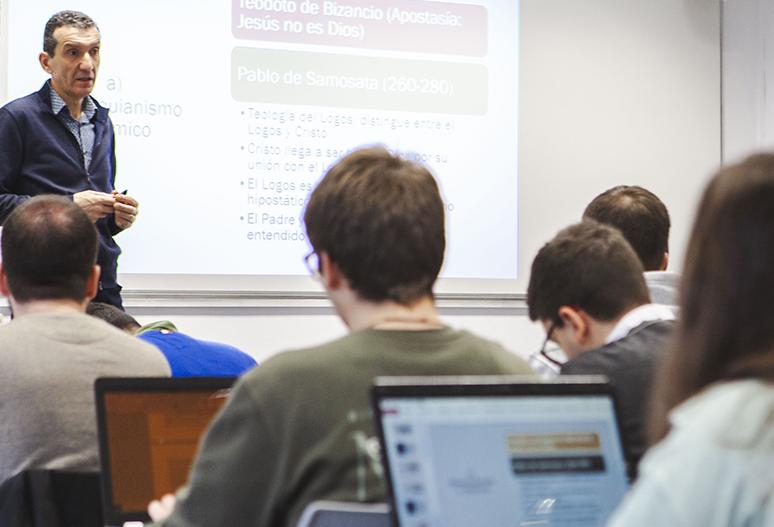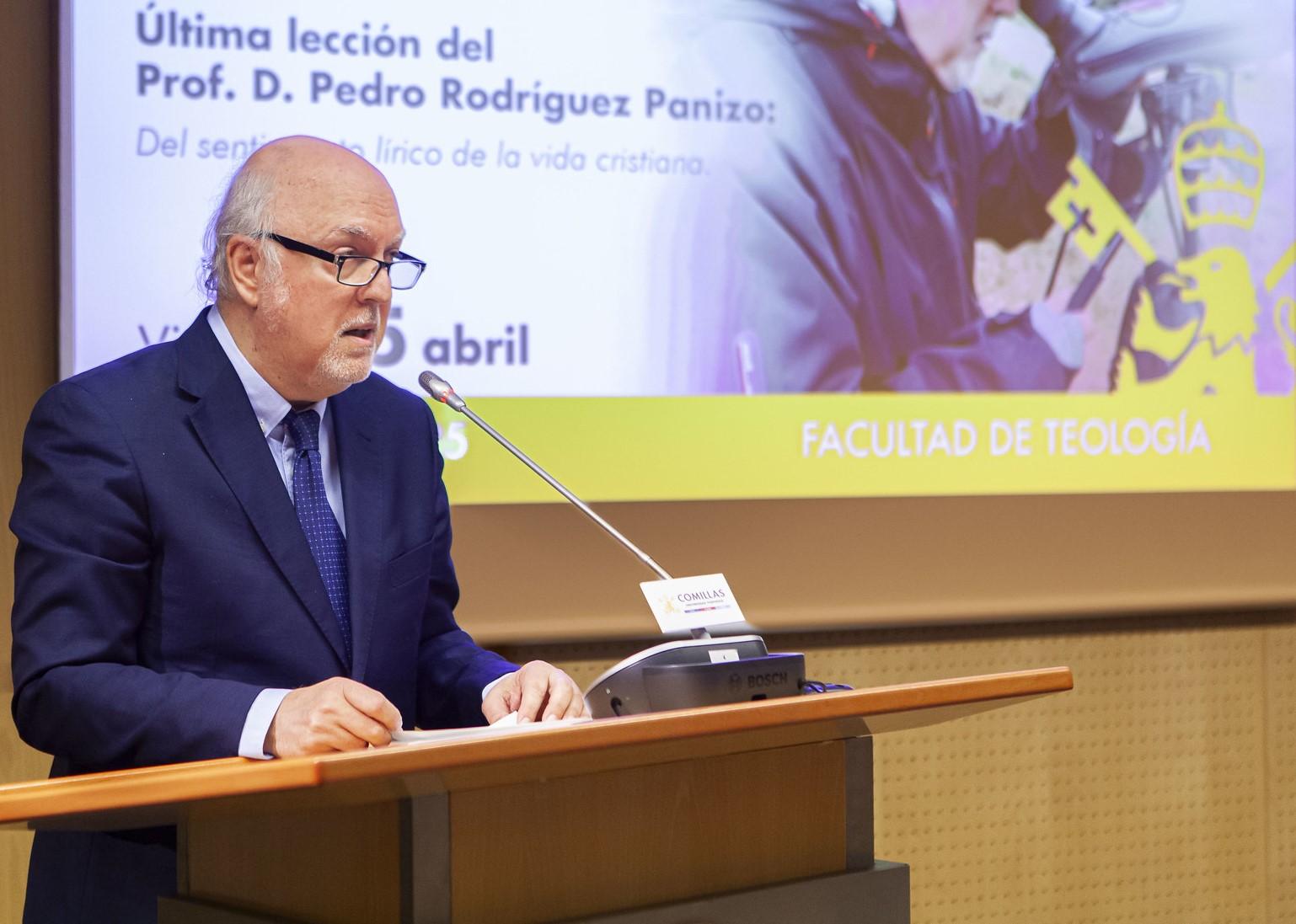Laudate Deum, climate crisis and COP28
Prof. Jaime Tatay, PhD, participated in this colloquium in Geneva, within the mission of the Holy See to the UN agencies

Professor Tatay during his speech
24 April 2024
At an event held in Geneva last Tuesday, 23 April, theology faculty professor Jaime Tatay had the privilege of participating in a colloquium organised by FAO, UNEP, the Caritas in Veritate Foundation and the Permanent Observer Mission of the Holy See to the United Nations Office and other international organisations in Geneva.
The colloquium, entitled "Laudate Deum: Apostolic Exhortation to all people of goodwill on the climate crisis and the outcomes of COP28", brought together academics, policy makers and civil society representatives to explore solutions and chart the way forward in addressing the climate crisis and its impact on food systems.
Colloquium participants shared their experience and explored innovative solutions to the climate crisis. The event was a testament to the power of collaboration and the importance of bringing diverse perspectives together to address global challenges. The colloquium was also a showcase of the advocacy potential of Christian social ethics and a demonstration of the Church's commitment to integral human development.
Below is the intervention of Professor Tatay:
Ladies and Gentlemen,
Today, we came here to discuss a pressing issue that affects us all, especially the poorest among the poor: food security.
Almost 10 years ago, Pope Francis's encyclical, "Laudato Si'," emphasized the importance of caring for our common home and recognizing the interconnectedness of all living beings.
In addressing the climate, biodiversity, and pollution crises, we must keep in mind the needs of the most vulnerable communities and work towards environmental protection, economic stability, social justice, and human well-being.
The impacts of climate change on our food systems are becoming increasingly obvious, and it is crucial that we take immediate action to mitigate these effects.
As Pope Francis affirmed in his recent Apostolic Exhortation, "Laudate Deum" (an update of his environmental encyclical Laudato si), there is an urgent need to recognize the interconnectedness of all living beings. We are all responsible for the well-being of our planet, and we must act with urgency to protect it.
The global food system is responsible for about a third of greenhouse gas emissions, making it the second-largest contributor to climate change after the energy sector.
At the same time, climate change is causing food insecurity to rise, with an estimated 345 million people affected in 82 countries in 2022.
This is a crisis that affects us all, but disproportionately impacts those in Sub-Saharan Africa, South and Southeast Asia, and Latin America where farming families are often poor and vulnerable.
To address this crisis, we must take a coordinated approach to jointly address issues of food security and energy security. We must develop strategies for food production and access that include investment in agricultural infrastructure, diversification of crops and food sources, food storage systems designed for long-term preservation, and training for local farmers on sustainable agriculture techniques.
We must also support smallholder farmers with access to credit and other services to promote economic empowerment. By increasing organic carbon in soil, we can increase water retention in soil, increasing resilience to drought. We must promote education on food preservation techniques such as refrigeration, dehydration, and other methods to reduce food loss and waste.
At an individual level, as all world religions encourage, we need to become conscious consumers and understand the impact our purchases have, directly or indirectly, on our society.
The COP28 Declaration on Food and Agriculture recognizes the importance of integrating agriculture and food systems into climate action and mainstreaming climate action across policy agendas and actions related to agriculture and food systems.
We must scale-up adaptation and resilience activities and responses in order to reduce the vulnerability of all farmers, fishermen, and other food producers to the impacts of climate change.
We must also promote food security and nutrition by increasing efforts to support vulnerable people through approaches such as social protection systems and safety nets, school feeding and public procurement programs, targeted research and innovation, and focusing on the specific needs of women, children and youth, Indigenous Peoples, smallholders, family farmers, local communities and persons with disabilities.
We have recently witnessed across Europe the problems facing those who want to make a decent living as food producers. We cannot forget to support workers in agriculture and food systems, whose livelihoods are threatened by climate change, to maintain inclusive, decent work, through innovative approaches which include increasing, adapting and diversifying incomes.
In conclusion, the impacts of climate change on our food systems are becoming increasingly apparent, and it is crucial that we take immediate action to mitigate these effects.
By working together, international organizations, government, CSOs, and FBOs, we can ensure a future where food availability is not threatened by a changing climate. Religious communities can play a role in promoting dialogue and using their influence at all levels to promote justice and reconciliation.
Let us all do our part to protect our planet and ensure food security for all.
Thank you
Jaime Tatay, SJ, PhD
Comillas Pontifical University
Professor Jaime Tatay Nieto holds a PhD in Theology from the Department of Moral Theology and Praxis of Christian Life, is also a Forestry Engineer and a recognised expert in sustainability, environmental ethics and the social doctrine of the Church. He is also co-director of the Hana and Francisco José Ayala Chair of Science, Technology and Religion.
All the latest news from the Faculty of Theology can be found on the website, in the monthly newsletter and on the social network X (formerly Twitter).
Image gallery
You may also be interested in

The Faculty of Theology reflected on power, faith and resistance in biblical traditions, in the framework of the Jubilee of Hope

The Faculty of Theology (Comillas CIHS) is ranked 34th in the world and is the best in the Spanish language, according to the latest ranking by subject

The lecturer of the Faculty of Theology gave his farewell speech, before his imminent retirement, appealing to the lyricism of the Christian life
